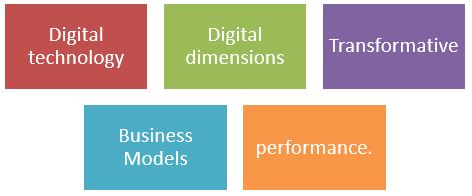The Transformative Impact Of Digital Technology On Business Performance
Abstract
Digital transformation is extremely dynamic and completely a timely approach that organizations offers to prioritize in its strategic design process which aligns business to the global digital trend. However, the aim of this study is to examine the influence of digital transformation on business performance. the study uses a qualitative approach method of literature review perspective by conducting a structured and general search of previous scholars’ works written and published through existing search engines such as journal articles from Google scholar, Direct Google search, and thesis literature respectively. Limiting its findings to only literatures written and published in English Language. The finding of this study shows that, digital transformation transmits the constant evolution of organizational strategies that integrate and align digital facility to essential business functions and operations which enables significant sources of main skill as organizational learning tool for strategic flexibility, and effective management that reduce human labor and speed stock availability to merge the customer demand and increase economic growth and competitive advantage.
Downloads
References
Alexander Osterwalder, Yves Pigneur, Christopher L. Tucci, “Clarifying business models: Origins, present, and future of the concept,” Communications of the Association for Information Systems, 16/1 (2005):
Anam, Chairul (2018), E-Money (Uang Elektronik) dalam perspektif hukum syariah.
Bank Indonesia (2017), Laporan Statistik Bank Indonesia
Burrell, J. (2020) Digital Transformation Considerations for Business Management.
Chanias S, Myers MD and Hess T (2019) Digital transformation strategy making in pre-digital organizations: the case of a financial services provider. The Journal of Strategic Information Systems 28(1): 17–33.
Chan, J. O. P. (2020). Digital transformation in the era of big data and cloud computing. Int. J. Intell. Inf. Syst, 9(3), 16.
Correani, A., De Massis, A., Frattini, F., Petruzzelli, A. M., & Natalicchio, A. (2020). Implementing a digital strategy: Learning from the experience of three digital transformation projects. California Management Review, 62(4), 37-56.
. Diawati, P., Nguyen, P. T., Rusliyadi, M., Lydia, E. L., & Shankar, K. (2019) Examination of Business Transformation Strategy: Building Bridges between IT and the Business. International Journal of Recent Technology and Engineering (IJRTE) ISSN, 2277-3878.
Digital transformation strategies. Business & Information Systems Engineering, 57, 339–343. doi: 10.1007/s12599-015-0401-5.
. Effendi, Y. (2019). Exploring the Potential of Financial Technology (E-Money) in Akad Wadiah at Amal Usaha Muhammadiyah. KnE Social Sciences, 578-591.
Efremov, V., Vladimirova, I. Crisis of the management paradigm – Is there light at the end of the tunnel? International Conference on Education, Economics and Management Research, Singapore, Atlantis Press 29-31 May, 2017.
Fitzgerald, M. et al., 2013. Embracing Digital Technology: A New Strategic Imperative. Findings from the 2013 Digital Transformation Global Executive Study and Research Project by MIT Sloan Management Review & Capgemini Consulting., Cambridge, MA. Available at: http://sloanreview.mit.edu/projects/embracing-digitaltechnology?switch_view=PDF
Gurbaxani, V., & Dunkle, D. (2019). Gearing Up For Successful Digital Transformation. MIS Quarterly Executive, 18(3).
Gass, O. et.al., (2015); Conceptualizing Individualization in Information Systems – A Literature Review; Communications of the Association for Information Systems, Vol 37 No. 3, Pp. 64- 88
Heckmann, N., Steger, T. & Dowling, M., 2015. Organizational capacity for change, change experience, and change project performance. Journal of Business Research, 69(2), pp.777-784.
Ivanov S (2019) Ultimate transformation: How will automation technologies disrupt the travel, tourism and hospitality industries? Zeitschrift fu¨r Tourismuswissenschaft 11(1): 25–43.
Ivanov, D. (2020). Predicting the impacts of epidemic outbreaks on global supply chains: A simulationbased analysis on the coronavirus outbreak (COVID-19/SARS-CoV-2) case. Transportation Research Part E: Logistics and Transportation Review, 136, 101922.
Jafari-Sadeghi, V., Garcia-Perez, A., Candelo, E., & Couturier, J. (2021). Exploring the impact of digital transformation on technology entrepreneurship and technological market expansion: The role of technology readiness, exploration and exploitation. Journal of Business Research, 124, 100-111.
Joe Weinman & Jim Euchner (2015) Digital Technologies and Competitive Advantage, Research- Technology Management, 58:6, 12- 17, DOI: 10.5437/08956308X5806003).
Kaplan, B., III, D. P., WasteII, D., Wood-Harper, A. T., & DeGross, J. I. (2004). Information Systems Research - Relevant Theory and Informed Practice.
Li, F. (2020). Leading digital transformation: three emerging approaches for managing the transition. International Journal of Operations & Production Management.
Liu, D.-Y., Chen, S.-W. & Chou, T.-C., 2011. Resource fit in digital transformation: Lessons learned from the CBC Bank global e-banking project. Management Decision, 49(10), pp.1728-1742.
. M.Jayalakshmi and G,Venkateswarlu, (2018), Casgless economy in India; Challenges and benefit, International Journal of Engineering Technology Research & Management, Vol (02) _Issue (07) ISSN: 2456-9348.
. Mahajan, K. D., Pandey, P., & Pandher, B. K. (2010). Application of RFID Technology in Libraries and Role of Librarian 109-118.
. MaryAnne M. Gobble (2018) Digital Strategy and Digital Transformation, Research-Technology Management, 61:5, 66-71, DOI: 10.1080/08956308.2018.1495969 )
Masum, A. K. M., Bhuiyan, F., & Azad, M. A. K. (2013). Impact of Radio Frequency Identification (RFID) Technology on Supply Chain Efficiency: An Extensive Study Global Journal of Research in Engineering.
Maulana, C. Z., Suryana S, Y., Kartini, D., & Febrian, E. (2019). Building Corporate Reputation through Corporate Social Re-sponsibility (CSR), Corporate Culture and Value Creation - In The Industry of Sharia Banking in Indonesia. Edición Especial, 35(89).
McFarlane, D., Sarma, S., Chirn, J. L., Wong, C., & Ashton, K. (2003). Auto ID Systems and Intelligent Manufacturing Control, Engineering Applications of Artificial Intelligence 16(4), 365-376.
Morabito, V. (2016). Digital Business Strategy and IT Alignment.
Morakanyane, R., Grace, A. A., & O'Reilly, P. (2017, June). Conceptualizing Digital Transformation in Business Organizations: A Systematic Review of Literature. In Bled eConference (p. 21).
Nachit, H., & Belhcen, L. (2020). Digital Transformation in Times of COVID-19 Pandemic: The Case of Morocco. Available at SSRN 3645084.
Nguyen, Dennis and Huynh (2018), Evolution of digital payments: Early learnings Systems. 11, (4), 306-3
Research Collection Lee Kong Chian School Of Business.
Nguyen, T., & Phuong Dang, T. (2018). Digital Banking in Vietnam Current Situation and Recommendations. International Journal of Innovation and Research in Educational Sciences, 5(4), 2349– 5219.
Nwankpa, J. K., & Merhout, J. W. (2020). Exploring the Effect of Digital Investment on IT Innovation. Sustainability, 12(18), 7374.
Omarini, A. (2017). The digital transformation in banking and the role of Fintechs in the new financial intermediation scenario. MPRA Paper 85228, University Library of Munich, Germany.
Pagani, M., & Pardo, C. (2017). The impact of digital technology on relationships in a business network. Industrial Marketing Management, 67, 185-192.
Padgett, D., & Mulvey, M. S. (2007). Differentiation via technology: Strategic positioning of services following the introduction of disruptive technology. Journal of Retailing, 83(4), 375-391.
Reinartz, W., Wiegand, N., & Imschloss, M. (2019). The impact of digital transformation on the retailing value chain. International Journal of Research in Marketing, 36(3), 350-366..
Schallmo, D., Williams, C. A., & Boardman, L. (2017). Digital transformation of business models— best practice, enablers, and roadmap. International Journal of Innovation Management, 21(08), 1740014
Sigala M (2018) New technologies in tourism: from multi-disciplinary to anti-disciplinary advances and trajectories. Tourism Management Perspectives 25: 151–155.
Stonehouse, G. H., & Konina, N. Y. (2020, February). Management Challenges in the Age of Digital Disruption. In 1st International Conference on Emerging Trends and Challenges in the Management Theory and Practice (ETCMTP 2019) (pp. 1-6). Atlantis Press.
Suharni,(2019). Uang elektronik (E-Money) ditinjau dari perspektif hukum dan perubahan social, journal non publish.
Sundaram, R., Ziade, J., & Quinn, E. (2020). DRIVERS OF CHANGE: AN EXAMINATION OF FACTORS THAT PROMPT MANAGERS TO ENFORCE CHANGES IN BUSINESS. International Journal of Management, 11(05).
Sunil Gupta. 2018. Driving Digital Strategy: A Guide to Reimagining Your Business. Boston, MA: Harvard Business Review Press.
Swan, M. (2015). Blockchain: Blueprint for a new economy. " O'Reilly Media, Inc.".
Udovita, P. V. M. V. D. (2020). Conceptual Review on Dimensions of Digital Transformation in Modern Era. International Journal of Scientific and Research Publications, 10(2), 520-529.
Wade, M., Noronha, A., Macaulay, J., & Barbier, J. (2017). Orchestrating Digital Business Transformation. Global Center for Digital Business.
Yoo, Y., Henfridsson, O. & Lyytinen, K., 2010. The New Organizing Logic of Digital Innovation: An Agenda for Information.

Copyright (c) 2022 INTERNATIONAL JOURNAL OF ECONOMICS, BUSINESS AND HUMAN BEHAVIOUR

This work is licensed under a Creative Commons Attribution-NonCommercial 4.0 International License.











